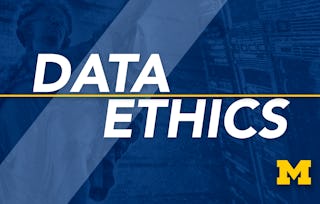Develop the ethical mindset every data scientist needs. In this course, you’ll examine the real-world implications of how data are collected, analyzed, and presented and the role of ethics in ensuring fairness, transparency, and trust.

Data Science Ethics with R

Data Science Ethics with R
This course is part of Data Science with R Specialization


Instructors: Mine Çetinkaya-Rundel
Access provided by Kalinga Institute of Industrial Technology
What you'll learn
Critically assess ethical concerns considering data intent and data privacy
Identify strategies that can be incorporated to help secure sensitive data
Define algorithmic bias and become conscious of when these situations may occur
Skills you'll gain
Details to know

Add to your LinkedIn profile
1 assignment
See how employees at top companies are mastering in-demand skills

Build your subject-matter expertise
- Learn new concepts from industry experts
- Gain a foundational understanding of a subject or tool
- Develop job-relevant skills with hands-on projects
- Earn a shareable career certificate

There is 1 module in this course
Data ethics is an essential component for those who work with data. In this module, we will become aware and hold discussions around how data visualizations can mislead and strategies to mitigate these types of situations. Further, we will discuss and critically think about data privacy. Lastly, we will define algorithmic bias and be aware of situations where this type of bias can occur.
What's included
5 videos17 readings1 assignment2 discussion prompts1 plugin
Earn a career certificate
Add this credential to your LinkedIn profile, resume, or CV. Share it on social media and in your performance review.
Offered by
Why people choose Coursera for their career

Felipe M.

Jennifer J.

Larry W.

Chaitanya A.
Explore more from Data Science

University of Leeds

University of Michigan

Google

The University of Notre Dame

